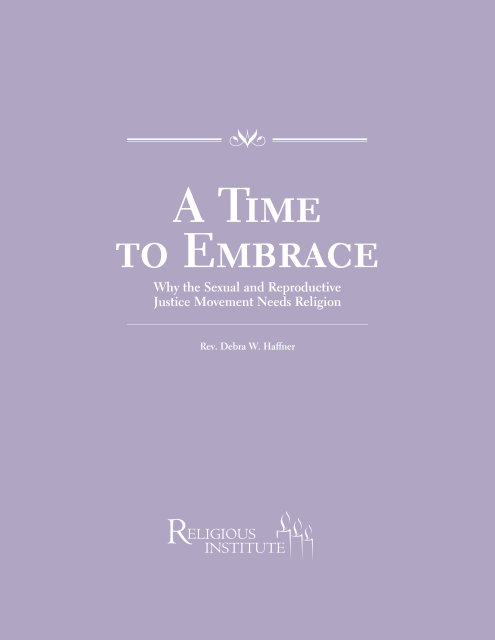NEW YORK – Renewing the engagement of religious leaders and people of faith is essential to the progress and long-term success of the sexual and reproductive health and justice movement. That’s the key finding of a new white paper to be published by the Religious Institute titled “A Time to Embrace: Why the Sexual and Reproductive Justice Movement Needs Religion.” Following a year of research, surveys and the deliberations of a national colloquium, the paper reveals a renewed potential among secular and faith organizations to address the morality of sexual and reproductive health decisions.
The Religious Institute conducted surveys with 45 of the country’s largest and most influential nonprofits, religious denominations and foundations that work on sexual and reproductive health, rights and justice. One hundred percent of foundations and faith-based organizations and 89 percent of secular organizations surveyed agreed or strongly agreed that it was important for the sexual and reproductive health and justice movement to do more to engage religious leaders and people of faith.
“The truth is: majorities of Americans – across religious traditions – support sexual rights, sexuality education and contraception,” said Reverend Debra W. Haffner, the Religious Institute’s Co-founder and President. “A majority of people in the United States – including people of faith from most religious traditions – also support women’s right to safe and legal abortions.”
Throughout most of the twentieth century, religious leaders played a central role in helping to legalize and increase access to contraception and abortion services. But today, the white paper found, that religious leaders on the Right are more visible in public policy debates. “It’s time for the American public to know that religious conservatives do not have a monopoly on moral views around sexual and reproductive issues,” Haffner added.
The Religious Institute’s review of polls uncovered a disconnect between Americans’ legal and moral views around abortion. While a majority of people support legal abortion, a majority also believes that abortion is not morally acceptable. The Religious Institute has labeled this the “morality/legality divide” and calls on sexual and reproductive health and justice organizations and leaders to articulate their work as a moral movement.
“Americans have a deep hunger to understand their sexuality as grounded in their spirituality and morals,” Haffner said. “To refocus the American conversation, we must articulate what is moral about access to reproductive health care and what is immoral about denying women access to life-saving services and information. We must reach out to the majority of people of faith and religious leaders to change the conversation about sexuality reproductive justice and morality.”
Find the full report here: http://www.religiousinstitute.org/time-to-embrace/
“A Time to Embrace: Why the Sexual and Reproductive Justice Movement Needs Religion” was funded by the David and Lucile Packard Foundation.
###





